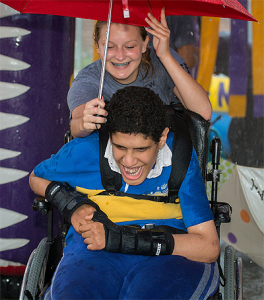
CECHS student Emerson Greer (holding umbrella) helps a Camp M.I. participant navigate a water activity.
Over the past several weeks, middle and high school students from HISD campuses across the district have been volunteering at Camp M.I. Way, a special program designed to give students with multiple impairments a chance to practice and expand their social skills in an atmosphere of fun.
As part of the camp, run by Homerun Hitters International, student counselors guide campers in various activities that are designed to engage the five senses. Emerson Greer, a rising junior at Challenge Early College High School, has served as a camp counselor for two years and describes the experience below:
People are generally afraid of what they can’t understand, and that is a statement that described me well. Throughout my time in elementary and middle school, I never had any real contact or experience with children with special needs, and now here I was, volunteering at a camp for the entire month of June that was all about children with special needs.
The thing that I was afraid of the most was hurting these children or doing the wrong thing, and not being able to recognize it. After all, most of the kids at Camp M.I. Way are in wheelchairs, and about 99 percent of them can’t speak. How was I supposed to know if I was angering them or hurting them? How was I supposed to realize if I was doing the right thing? And really, there are just three words to answer those questions, and they are: focus, believe, and interpret.
The very first day I walked into the cafeteria at T.H. Rogers to greet the campers, I was freaking out. Sure, the children all looked harmless, but to me, they couldn’t be any scarier. But then I paused a moment and asked myself, “Why am I afraid? They are probably just as terrified of me as I am of them.” So I told myself to get it together and I walked up to a camper and greeted them in the way that I was taught during my three days of training.
The first thing I was trained to do is wait until the camper looks at me, and then once they do, acknowledge them and say, “Wow, I see that you looked at me. What a great way to say hello!” Like I said previously, pretty much all of the campers can’t speak, so eye contact is their way of saying hello. Next, you do a home run with the camper, which means that you pay close attention to their movements. Each movement that they make counts as a base. For example, if the camper moves their foot, you say, “I see that you moved your foot, great job, first base,” and so on until the camper gets a home run. The point of the home run is to make the camper realize what they are doing, and praise them for being able to do it. After the home run, you tell the camper five things that they are going to do that day, and then you exit the cafeteria with the rest of the campers and counselors and go to camp.
The camp is a giant room and outside area that is set up with various activities for the campers. The activities include baseball and bowling, a track for wheelchair races, a “store” that has a snow-cone machine with a variety of flavors, and a waterfall that has a bunch of toys. The camper that I spent the most time with during my three weeks as a counselor really liked the waterfall. Every day, he would sit down in front of it and start splashing around. Plenty of times I tried to tear him away from the water when it was time to go to a different activity, but he just did not want to leave. He was having so much fun with it.
After just a few days, I slowly started to feel more comfortable around the campers. I played in the water with my camper and let him squirt me with the water gun. I chased him around as he did wheelchair races, and I helped him bowl. Soon I realized that I wasn’t afraid anymore, and then it dawned on me that these kids really aren’t all that different from other kids. Sure, they might not be able to do all the same things that others are able to do, but they all deserve to have some fun, and they deserve to be treated like they aren’t different from everyone else. That is what Camp M.I. Way is all about. Once I realized that, my curtain of fear dropped, and I began to feel like I was playing with a friend or sibling. I also began to have fun myself.
Thank you so much for assisting my son in having so much fun. Your his angel .God bless you.